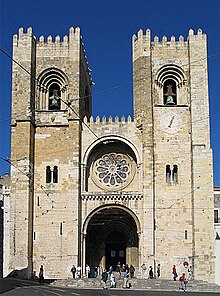Roman Catholic Archdiocese of Lisbon
|
Patriarchate of Lisbon Patriarchatus Ulixbonensis Patriarcado de Lisboa |
|
|---|---|

|
|
| Location | |
| Country | |
| Statistics | |
| Area | 3,735 km2 (1,442 sq mi) |
| Population - Total - Catholics |
(as of 2015) 1,924,650 1,648,885 (85.7%) |
| Parishes | 284 |
| Information | |
| Denomination | Roman Catholic |
| Rite | Roman Rite |
| Established | 4th century |
| Cathedral | Lisbon Cathedral |
| Current leadership | |
| Pope | Francis |
| Patriarch | Manuel III |
| Suffragans |
Angra Funchal Guarda Leiria-Fátima Portalegre-Castelo Branco Santarém Setúbal |
| Auxiliary Bishops | D. Nuno Brás da Silva Martins D. Joaquim Augusto da Silva Mendes D. José Augusto Traquina Maria |
| Map | |
 The Archdiocese of Lisbon shown in a darker red. |
|
| Website | |
| http://www.patriarcado-lisboa.pt | |
The Latin Patriarchate of Lisbon (Latin: Patriarchatus Ulixbonensis) is a Metropolitan Archdiocese of the Latin Rite of the Roman Catholic Church based in Lisbon, national capital of Portugal. The diocese is said to have existed since the first century, but historical evidence shows its existence only since the 4th century.
Its cathedral archiepiscopal see is : Sé Patriarcal de Santa Maria Maior, in Lisbon
The Patriarchate also has three Minor Basilicas : Basílica de Nossa Senhora dos Mártires and Basílica do Santíssimo Coração de Jesus da Estrela, both in Lisbon, and the Basílica de Santo António, in Mafra
two World Heritage Site monasteries: Mosteiro dos Jerónimos, in Lisbon, and Mosteiro de Santa Maria de Alcobaça, in Alcobaça
The patriarchate pastorally served, as per 2014, 1,648,885 Catholics (85.7% of 1,924,650 total) on 3,735 km² in 285 parishes and 604 missions, with 543 priests (291 diocesan, 252 religious), 84 deacons, 1,505 lay religious (401 brothers, 1,104 sisters) and 54 seminarians.
The diocese of Lisbon was created in the 4th century, but it lay vacant after 716 when the city was captured by the Moors, notwithstanding that there are references to Mozarabic bishops of the Mozarabic Rite in that period. The diocese was restored when the city was captured by king Afonso I of Portugal during the Second Crusade in 1147 during the siege of Lisbon. A crusader's account of that event refers to the local "elderly Bishop of the city" being slain "against all right and justice", by marauding Flemish and German crusaders, in direct defiance of the terms of the city's rendition.
...
Wikipedia
